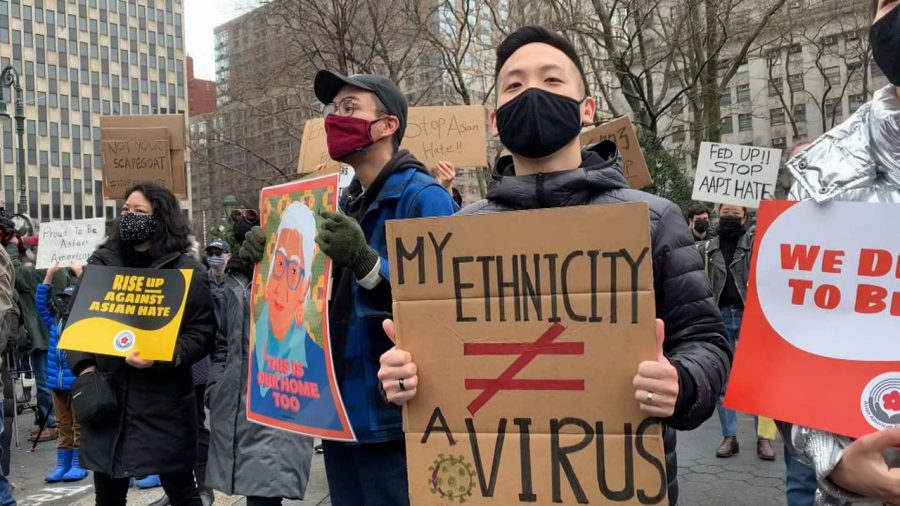The Rise of Anti-Asian Violence During the COVID-19 Pandemic
March 27, 2021
In December of 2019, the first case of the coronavirus disease was reported in Wuhan, China. Now almost 17 months after the first case, more than 124 million cases have been confirmed worldwide, according to the World Health Organization (WHO).
The COVID-19 global pandemic has brought about several adjustments to our everyday lives: wearing masks in public, social distancing, and attending school virtually are just a few of the ways that it has changed our lives. While all of these changes can be categorized as efforts to reduce the spread of COVID-19, the spread of another virus has increased in its midst—hate crimes against the Asian American and Pacific Islander (AAPI) community.
This virus may not be a physical one, but its effects have been no less than damaging. According to Kimmy Yam of NBC News, hate crimes in 16 of America’s biggest cities decreased by 7% in 2020 but increased by nearly 150% in regards to Asian Americans. Stop AAPI Hate, a center initiated to track and respond to acts of anti-Asian violence, received “nearly 3,800 hate incidents reported against Asian-Americans and Pacific Islanders nationwide over the last year,” states Christine Hauser of The New York Times.
Data compiled by VOA and reported by Masood Farivar indicates that major cities with large Asian populations have seen the highest spikes in these incidents since 2019, with an 833% increase in New York City, 114% increase in Los Angeles, and 133% increase in Boston.
Anti-Asian hate crimes have only continued to rise in the early months of 2021. “Many of the victims are non-Chinese Asians who apparently were mistaken for having hailed from China,” conveys Farivar of VOA. On January 28th, an 84-year-old Thai man named Vicha Ratanapakdee was violently shoved to the ground while taking his daily morning walk in a San Francisco neighborhood. On February 3rd, a 64-year-old Vietnamese woman was assaulted and robbed of $1,000 outside of a market in San Jose, California. Also on February 3rd, a 61-year-old Filipino man named Noel Quintana was slashed across the face on a subway in Manhattan.
“The idea that we are today in 2021 still having conversations we were having in 1881, a year before the Chinese Exclusion Act in 1882, is painful and infuriating at the same time,” said Governor Gavin Newsom of California during a press conference held on March 19th. Newsom denounced these hate crimes both in his own state and nationwide, as anti-Asian violence had just recently jumped to a whole new level on the east coast.
On March 16th, a 21-year-old white male named Robert Aaron Long shot and killed eight people at three spas in Atlanta, Georgia. The fatal victims include Xiaojie Tan, 49; Daoyou Feng, 44; Delaina Ashley Yaun, 33; Paul Andre Michels, 54; Soon C. Park, 74; Hyun J. Grant, 51; Suncha Kim, 69; and Yong A. Yue, 63. Six of the victims were women of Asian descent. “Though authorities said the suspect claimed the attacks were not motivated by racism, community leaders say it can’t be ignored that Asian Americans were targeted by the attacks,” states Greg Bluestein of The Atlanta Journal-Constitution.
Advocates of Asian American rights are attributing the upswing of anti-Asian violence to former President Donald Trump’s use of xenophobic rhetoric. In 2020 press briefings, Twitter posts, and public speeches, Trump consistently referred to COVID-19 as “the China virus,” implying that he blames the country for the disease and resulting global pandemic. “There’s a clear correlation between President Trump’s incendiary comments, his insistence on using the term ‘Chinese virus’ and the subsequent hate speech spread on social media and the hate violence directed towards us. [He’s giving] people [the] license to attack us,” expresses Russell Jeung, a professor of Asian American Studies at San Francisco State University and co-founder of Stop AAPI Hate.
During his first week in office, President Joe Biden issued an official memorandum in which he condemned xenophobic rhetoric used by political leaders in the U.S. government. He acknowledged the harm these sentiments have caused toward the AAPI community and has declared to combat “racism, xenophobia, and intolerance against Asian Americans and Pacific Islanders.”
“The Federal Government should … work to ensure that all members of AAPI communities — no matter their background, the language they speak, or their religious beliefs — are treated with dignity and equity,” Biden asserted. He also referenced the matter in his first national prime-time address on March 11th, the one-year anniversary of WHO declaring the coronavirus pandemic.
Vice President Kamala Harris, the first Asian American to hold this position, has also called for action on anti-Asian violence. “[The President] and I want the Asian American community to know we stand with you,” she expressed in a Twitter post.
Along with the efforts of the Biden-Harris administration, community leaders and operations have also demonstrated their support for the AAPI community. According to Cady Lang of TIME, an anti-gentrification group known as the Black Bay Area has raised money to aid Asian-led organizations in San Francisco and Oakland. The Anti-Police Terror Project, the Ella Baker Center for Human Rights, and the Asian Pacific Environmental Network have also “joined forces on initiatives like recommending that people show their support by frequenting Chinatowns and their merchants and showing solidarity by wearing yellow.”
You may be wondering, what can you personally do to support this ongoing movement. If you happen to witness an act of anti-Asian violence, be an active bystander and make sure to report the incident to stopaapihate.org. Purchase food and other products from your local Asian-owned businesses. If you are in the position to do so, donate to nonprofits and organizations that are providing assistance for legal aid, pandemic recovery, legislative efforts, mental health, and businesses in the AAPI community. Most importantly, educate yourself on the issue and speak up on your social media platforms. It is vital for citizens, both Asian and non-Asian, to continue spreading awareness on incidents of anti-Asian hate crimes.
Asian Americans across the nation are afraid to go about their everyday lives in public. Attending in-person school, going to work, even getting tested or vaccinated for COVID-19 has put the AAPI community in a constant state of fear. We must end the long history of racism, discrimination, and xenophobia against Asians living in the U.S. We must stand with our Asian brothers and sisters. We must #StopAsianHate.
For more information on how to support the AAPI community, click here: https://anti-asianviolenceresources.carrd.co/












































